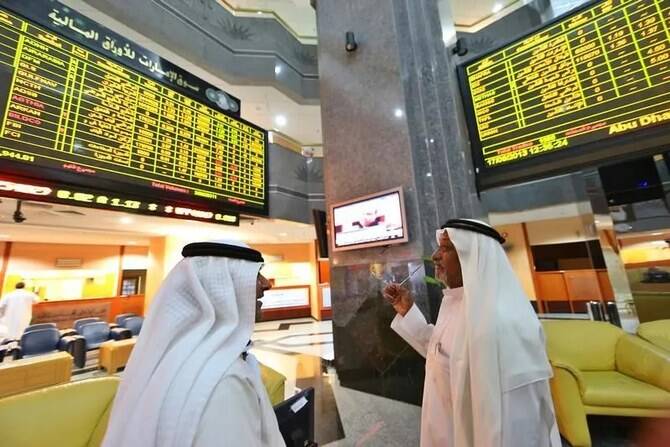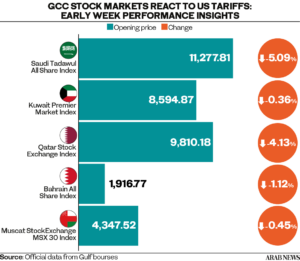
- ARAB NEWS
- 01 Aug 2025

RIYADH: Gulf bourses experienced a downturn on Sunday as fresh US tariffs dampened investor confidence across the region, leading to widespread sell-offs in line with last week’s global market slump.
Saudi Arabia’s benchmark Tadawul All Share Index dropped by 5.06 percent at the open, marking its sharpest single-day decline in months. Qatar’s QE Index saw a decline of 4.13 percent, while Kuwait’s Premier Market Index slipped by 0.36 percent.
Other regional markets also felt the pressure. Muscat’s MSX 30 Index dipped by 0.17 percent, and the Bahrain All Share Index fell by 0.56 percent as investors weighed the impact of escalating trade tensions and a decline in oil prices.
This followed the announcement by US President Donald Trump of a 10 percent reciprocal tariff on Gulf imports.
Although UAE markets were closed on Sunday, the Abu Dhabi Securities Exchange ended the previous week with a 1.9 percent loss on Friday. Similarly, Dubai’s DFM General Index closed 1.5 percent lower on April 4, indicating that further declines could occur when trading resumes on Monday.
In Egypt, trading was temporarily halted in several stocks on Sunday for 10 minutes after having dropped by 5 and 10 percent, in line with market regulations designed to prevent excessive volatility.
Tariff turmoil rattles markets
The White House confirmed on April 2 that a 10 percent tariff on Gulf Cooperation Council imports, effective April 5, was imposed to address what President Trump described as “long-standing unfair trade practices.”
Although the Gulf states were spared from more severe penalties—41 percent for Syria and 39 percent for Iraq—the move has raised concerns about rising import costs for US-sourced goods, particularly in sectors like construction and electronics.
“These tariffs will remain in effect until such a time as President Trump determines that the threat posed by the trade deficit and underlying nonreciprocal treatment is satisfied, resolved, or mitigated,” the White House said in a statement on April 2.
Banking sector hit hardest
Gulf banking stocks were hit hardest amid growing fears of a potential US economic slowdown. The sell-off mirrored the steep losses seen on Wall Street on April 4, where the S&P 500 plummeted 9.58 percent, wiping out $5 trillion in market value and marking one of its worst declines in 70 years, according to Reuters.
The Nasdaq Composite Index also dropped by 5.8 percent on Friday, losing 962.8 points and officially entering bear market territory, driven by mounting global economic concerns.

Oil prices add to the pressure
Although the White House confirmed that oil and gas imports would be exempt from the new tariffs, Saudi oil giant Aramco still experienced a dip in market value during Sunday’s trading session. Its shares fell more than 4 percent, largely due to the sharp drop in oil prices.
For the GCC, the White House’s exemption is significant, as oil and gas constitute over 60 percent of Saudi Arabia’s exports to the US and remain a vital part of Gulf-US trade relations.
Oil prices plunged 7 percent on Friday, hitting a three-year low, after China retaliated in the escalating trade war by imposing 34 percent tariffs on all American goods, effective April 10.
This move, coinciding with global preparations for countermeasures against Trump’s tariffs—the highest in over a century—sent shockwaves through markets, with investors increasingly factoring in recession risks.
JP Morgan raised its forecast for a US and global recession to 60 percent, up from 40 percent, warning that escalating tariff tensions are undermining business confidence and threatening to derail global growth.
S&P Global also adjusted its “subjective” odds of a US recession, raising them to 30-35 percent, up from 25 percent in March.
Goldman Sachs had already revised its US recession risk to 35 percent from 20 percent ahead of the April 2 tariff announcement, citing weakening economic fundamentals.
HSBC noted on Thursday that the recession narrative is likely to strengthen, although markets have already factored in some of the risks.